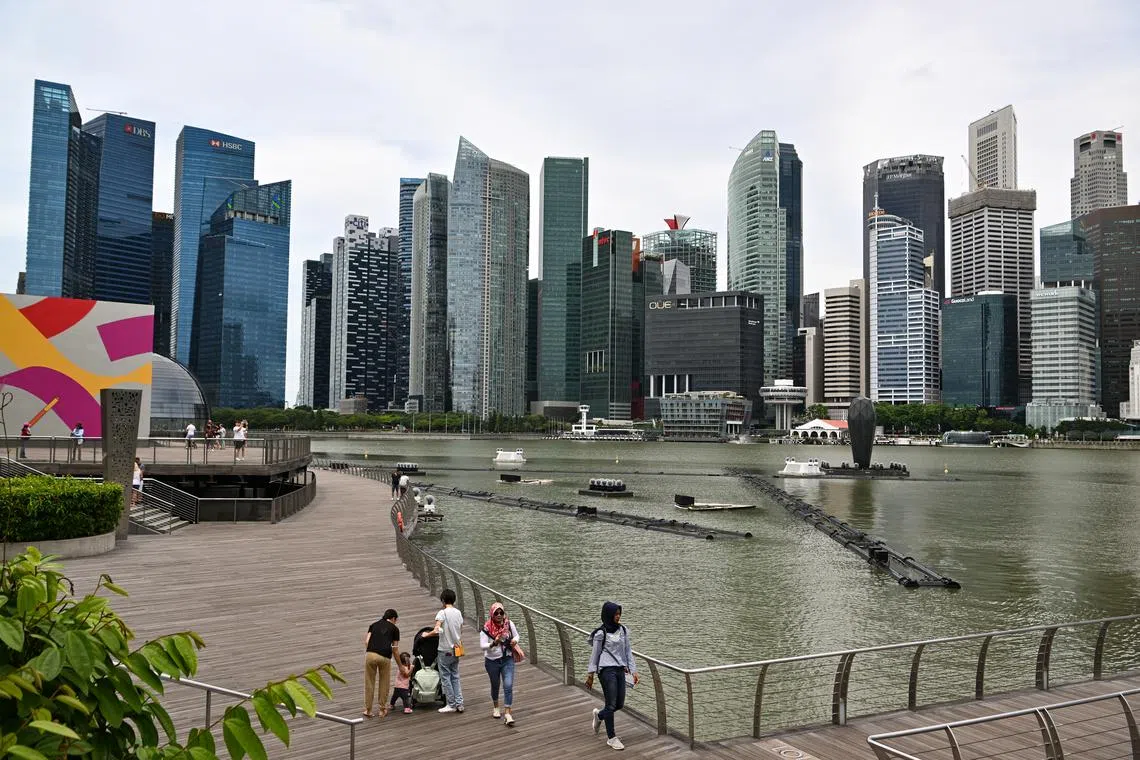IMF sees Singapore growth slowing to 1.5% in 2023 as global headwinds offset China boost
Sign up now: Get ST's newsletters delivered to your inbox

Singapore will also experience elevated inflation in 2023, partly because of the GST hike.
PHOTO: ST FILE
SINGAPORE – The International Monetary Fund (IMF) has lowered its 2023 growth forecast for Singapore, along with those of its Asean neighbours, saying that slowing global growth will outweigh the positive impact from China’s economic reopening.
Its chief economist Pierre-Olivier Gourinchas said Singapore’s economy will grow by 1.5 per cent in 2023, slower than the 3.7 per cent growth achieved in 2022.
Speaking on Tuesday at a media conference held here to mark the release of the IMF’s latest World Economic Outlook, he said the forecast for Singapore was lowered from a projection of 2.3 per cent made in October, in line with slower growth in most of the Republic’s major trading partners. The IMF forecast falls within the Ministry of Trade and Industry’s prediction of a 0.5 per cent to 2.5 per cent growth this year.
The IMF estimates that global growth will slow to 2.9 per cent in 2023 from an estimated 3.4 per cent in 2022. The latest estimate is higher than the 2.7 per cent projection in October because of the reopening of China’s economy and the better than expected outlook for some economies.
But while China’s economic growth will rebound to 5.2 per cent in 2023 from just 3 per cent in 2022, other major trading partners of Singapore, such as the United States and Europe, will suffer slowing growth. The US economy will grow at 1.4 per cent in 2023, down from 2 per cent in 2022. The euro area’s growth will come at 0.7 per cent, sliding from 3.5 per cent a year earlier, while the British economy will shrink by 0.6 per cent.
Mr Gourinchas said: “What is really important for Singapore, and it is true for many other Asian economies, is the openness to trade. This is an economy that is going to be very influenced by what is happening in terms of global activity.”
In a separate interview with The Straits Times, he said that even as growth eases, inflation in Singapore is likely to remain elevated, before decelerating significantly in 2024.
He said the IMF’s 2023 forecast for headline inflation in Singapore is 5.8 per cent, up 2.8 percentage points from its October estimate, partly because of the hike in the goods and services tax. In 2022, inflation averaged at 6.2 per cent, he said.
However, he said Singapore’s inflation will ease to 3.5 per cent in 2024 as the one-off effect of GST would dissipate. “I am not particularly worried. Inflation is elevated... but we are expecting that inflation will be coming down to around 3.5 per cent.”
According to the IMF, the Asean-5 – which comprises Indonesia, Malaysia, the Philippines, Singapore and Thailand – will grow by 4.3 per cent. That compares with 5.2 per cent growth in 2022 and 3.8 per cent in 2021.
Mr Gourinchas said at the media briefing that while China’s economic rebound in 2023 will help the region, Asean’s growth forecast was downgraded from an earlier estimate of 4.5 per cent because of slower growth in the other major trading partners.
While the IMF believes that growing trade tensions between the US and China will weigh down global growth
Mr Gourinchas told ST that in the context of a global supply reconfiguration, there is an “upside risk” to Singapore’s outlook.
“It may become a destination for some investments that would otherwise be going elsewhere. In the current environment, it can be seen, in a sense, as a safe place for investors and multinational corporations,” he said.



